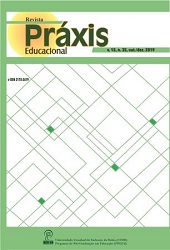The TEACHING PRACTICE FOR THE INCLUSION OF STUDENTS WITH DISABILITIES IN COLLEGE EDUCATION
DOI:
https://doi.org/10.22481/praxisedu.v15i35.5663Keywords:
Higher education, Teaching practice, Students with disabilitiesAbstract
The permanence and academic success of students with disabilities in Higher Education Institutions requires the use of diversified methodologies and the development of inclusive practices by teachers who work at this level of education. With the objective of identifying and analyzing the
differentiated practices developed by professors of the Federal University of Recôncavo da Bahia (UFRB) in the teaching process of students with disabilities enrolled in undergraduate courses, this study was carried out from a qualitative research approach, as a case study. In the data collection process, a questionnaire was applied and semi-structured interviews were conducted with UFRB teachers who worked with students with disabilities. The study brings the reference of Brazilian legislations and institutional norms that govern the inclusion in the university in question, as well as is based on several authors that approach this theme. The data collected in this work were organized into three categories of analysis about indicators of the diversification of strategies used by teachers to include students with disabilities in undergraduate courses at UFRB, such as: the use of diversified didactic resources; flexibility in pedagogical time; diversification in the instruments and forms of application of evaluative activities. It is considered that such practices are conducive to the permanence and academic success of people with disabilities in Higher Education, since they create the possibility of active participation in the activities developed.
Downloads
Metrics
Downloads
Published
How to Cite
Issue
Section
License
You are free to:
Share - copy and redistribute the material in any medium or format; Adapt - remix, transform, and build from the material for any purpose, even commercially. This license is acceptable for Free Cultural Works. The licensor cannot revoke these freedoms as long as you follow the terms of the license.
Under the following terms:
Attribution - You must appropriately give credit, provide a link to the license, and indicate if any changes have been made. You may do so in any reasonable way, but not in a way that suggests that you or your use is endorsed by the licensor.
There are no additional restrictions - You cannot apply legal terms or technological measures that legally restrict others to make any use permitted by the license.










